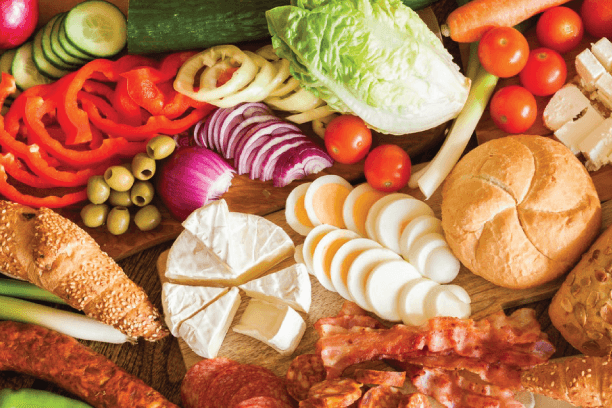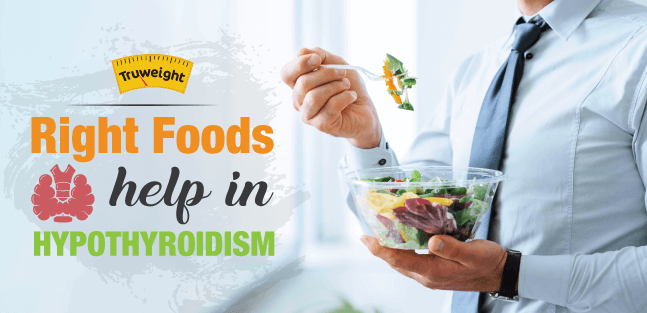Disease, Food & Nutrition, Health
Tips To Pick Right Foods for Hypothyroidism | Possible
Hypothyroidism can lead to weight gain, so as to avoid unwanted weight, you need to eat the right foods for hypothyroidism.
Pick iodised salt, whole grain cereals, nuts, milk products and selenium-rich foods to control weight gain due to hypothyroidism.
Table of Content
Hyperthyroidism is a hormonal disorder in which the thyroid gland does not produce enough thyroid hormone.
As per the 2017 report published by the diagnostic chain SRL diagnostics, 32% of India’s population suffer from various kinds of thyroid disorders.
The same report stated that hypothyroidism is the most prevalent thyroid disorder.
Hyperthyroidism can be managed with better lifestyle changes and the food is the major part of that. Read on to know more about the best food for thyroid patients.
The symptoms of hypothyroidism include excessive fatigue and weight gain.
Right foods for hypothyroidism
Hypothyroidism is common in India due to the low iodine content in the soil. Though most communities in India depend on cereals, the type consumed varies according to the geographic region.
For example, hypothyroidism is common in the parts of the country where refined cereals are taken as a staple diet. So, diet is the first line of defence when it comes to tackle and manage hypothyroidism.
Lean Towards Indian Cereals
Cereals form a predominant part of any hypothyroid diet plan. The ideal consumption must be around seven to nine servings per day, with each serving up to 30 grams.
Only who cereal grains should be used and refined cereals completely avoided.
Cereals are rich in fibre and they help in weight loss and relieve constipation, both of which are common symptoms of hypothyroidism.
The following cereals can be used, either as food form mentioned below or any food of your choice:
| Cereal | Food item that can be cooked |
| Oats | Can be used as a porridge, upma or pancakes |
| Quinoa | Use in salads or roti or make missi or upma |
| Rice | Cook brown rice or black rice and eat with veggies of your choice |
| Millets | Use Bajra and Jowar in rotis or in thalipeeth |
| Wheat (Whole and Broken) | Use in Chapatis, Khakras, and broken wheat upma |
Never Skip Pulses
Pulses, especially dals are power packed and energy rich. They are low in fat and rich in protein, phytonutrients, and oxygen apart from the fibre.
It is one of the important foods for hyperthyroidism because of the high protein content. It can reduce fatigue and help you manage weight.
At least three servings of dal or pulses are recommended. All kinds of dals and pulses such as chickpea, rajma, channa, and kidney beans can be included.
Snack on nuts
Snack on all kinds of nuts when hungry. This will help you avoid junk food. Even though it is one of the foods for hypothyroidism, not overindulge in nuts as you may end up accumulating fat.
Stick to nuts rich in omega-3 fatty acids such as walnuts.
They help reduce the stress in the body and maintain the integrity of brain cells that can help you overcome lethargy (a common symptom of hypothyroidism). Nuts rich in selenium like Brazil nuts help stimulate the thyroid gland and activate it.
Include the generous amount of milk and milk products
Milk and milk products rich in calcium and proteins should be included in your foods for hypothyroidism list.
Calcium sustains the activity of the muscle, thereby reducing fatigue whereas proteins present in milk products help in the distribution of thyroid hormone through the body.
The extant in milk products help in the synthesis pathway of the hormones.
Have 1 serving of low-fat milk and at least two to three servings of milk products such as low-fat curd, paneer, and cheese.

Your diet plan for hypothyroidism should have
Your right foods for hypothyroidism should include items that help stimulate the under-active thyroid. Include the following:
- Iodized salt (added to all food when cooked)
- Whole grains in the form of cereals
- Seaweed incorporated with food, especially salads (A good source of iodine)
- Selenium-rich food like tuna fish and ham
- Onion and garlic
- Cold pressed oil from seeds (not refined oil)
- Berries that are rich in antioxidants like blackberries and raspberries
- Native and seasonal fruits like avocado, grapefruit, native berries, cherries, papaya and plums that are rich in antioxidants
- Spouts of pulses like moong, chickpea, and channa
- Native vegetables especially carrot, tomato, capsicum, beetroots, ladies finger, yam and gourd varieties.
- Spices like cinnamon, local chillies, and pepper.
Foods to Exclude for Hypothyroidism
The below-listed foods are to be avoided as to manage weight and other symptoms of hypothyroidism.
- Readily available fast food like pizza, burger, fries etc.
- Baked goods made with refined flour like white bread, pasta, nan, romali roti etc. Use whole wheat or multigrain alternatives instead.
- Soya and soy-based They contain a high amount of estrogen that can increase the risk of hypothyroidism.
- Cruciferous vegetables like cabbage, cauliflower, broccoli, turnips, and Digesting these vegetables, blocks the thyroid gland’s ability to absorb iodine. Iodine is essential for the normal functioning of the thyroid gland.
- Canned juices, sodas, and carbonated drinks
- Coffee because it inhibits the absorption of hypothyroid medications
- Alcohol because it suppresses the functioning of thyroid gland and it also causes toxicity in the cells.
By understanding an underactive thyroid diet what to eat, coupled with regular exercise you can tackle hypothyroidism with ease.
QUICK BYTES
1. Can I have a toast for breakfast regularly if I have hypothyroidism?
You can have multigrain toast or whole wheat toast occasionally. It is good to cut down gluten intake when you have hypothyroidism.
2. I suffer from hypothyroidism. What kind of beverage can I have?
Black tea and Green tea is good for hypothyroid patients. Green tea can help you beat the sluggishness and fatigue.
3. Can I include chicken in my hypothyroid diet plan?
Yes. You can have chicken and other poultry, preferably skinless chicken.
4. Can I eat spinach regularly if I have an underactive thyroid gland?
Spinach can be had occasionally. Take it in small quantities and it should be well cooked.
5. Can I have vitamin or mineral supplements along with my thyroid medication?
Yes. Supplements can be had along with thyroid medication. However, consult your doctor before you take any medication along with thyroid tablets.
Watch Vishnu Priya’s successful journey of tackling thyroid and managing weight here.
You could speak to professional nutritionists to know more about well-planned thyroid diet chart.

Pls suggest diet plan with combination of exercise for hypothyroidism
Hi Archana! Hi Archana! Kindly follow the provided link or call on toll free number 18001021255 to speak to the concerned team. https://truweight.in/blog/food-and-nutrition/indian-diet-plan-weight-loss-4-weeks.html
I have gained weight and had drastic hair fall. Taking 75 mcg thyroxin.pls suggest something to lose weight and stop hairfall
Hi Archana! Kindly follow the provided link or call on toll free number 18001021255 to speak to the concerned team. https://truweight.in/blog/food-and-nutrition/indian-diet-plan-weight-loss-4-weeks.html
Unable to open link given
Not able to open
The link you have given